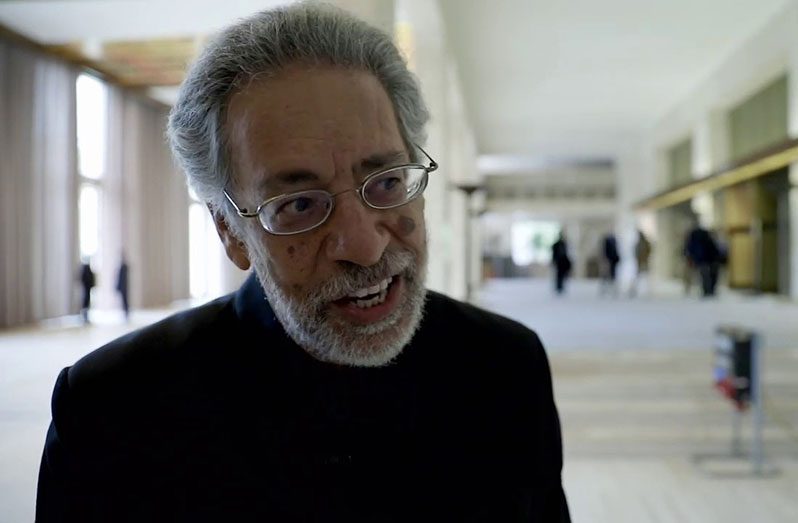— chair of PAHO Advisory group says, urges acceptance of vaccines once available
THE rollout of COVID-19 vaccines has only just begun in a few Caribbean countries, but Chairman of the PAHO Regional Immunisation Technical Advisory Group, Professor Peter Figueroa, highlighted that the vaccination ongoing in other parts of the world has contributed to a decrease in the number of cases and deaths.
“What is impressive is that with the rollout of the vaccine, we are seeing a dramatic decline globally in the number of new cases of COVID,” Professor Figueroa said while speaking at a virtual forum organisation by the COVID-19 Task Force of the University of the West Indies (UWI).
In the US, where there are more than 27 million confirmed cases and more than 500,000 deaths due to COVID-19, the professor related that the number of new cases recorded has decreased by about 40 per cent since the vaccines have been rolling out over the past six weeks.
Beyond that, based on averages, he said that the hospitalisation of persons who have been infected with a more severe form of COVID-19 has declined by about 30 per cent, while the deaths have been reduced by about 16 per cent.
Figueroa, who has been working with the Pan-American Health Organisation (PAHO) on vaccination across the Caribbean, emphasised that vaccines have proven to be effective tools to protect against infections. He affirmed that the vaccines that are available have undergone very careful review by regulatory authorities and the World Health Organisation (WHO).
In fact, he said that aside from the non-pharmaceutical measures (wearing a mask and maintaining a social distance, for example), vaccines are the “best thing to get”. He also expressed happiness that vaccine distribution has begun in the Caribbean.
DISTRIBUTION BEGUN
Guyana, Barbados and Trinidad and Tobago have begun distributing the first dose of the Oxford-AstraZeneca COVID-19 vaccine. This vaccine was donated to Barbados by India, under the South Asian’s country Vaccine Maitri (friendship) initiative; Barbados shared some of the donated doses with other Caribbean countries.
This Oxford-AstraZeneca vaccine, which is manufactured in India by the Serum Institute, has an efficacy of 62 per cent, while it offers 100 per cent protection against the severe form of COVID-19, hospitalisation and death in a primary analysis of Phase III clinical trials. However, studies carried out in a smaller sub-group reported that the vaccine is 90 per cent efficacious, with a lower dose than the required two doses.
Now, according to a newer study from the Oxford University that is under review at the Lancet, a single standard dose of the vaccine provided 76 per cent protection (or efficacy) overall against symptomatic COVID-19 in the first 90 days (about 12 weeks). Then, vaccine efficacy reached 82.4 per cent after a second dose in those persons with a dosing interval of about 12 weeks.
In Guyana, the vaccine is being given to frontline healthcare workers who are at a higher risk of contracting the virus, COVID-19. After these workers are able to get the protection, elderly persons, other frontline workers and persons with comorbidities (other underlying health conditions) will receive their vaccines.
VERY, VERY IMPORTANT
“It is very, very important that the essential frontline workers get vaccinated so that they are protected and when the doctors and nurses are vaccinated it also prevents them from unwittingly passing it on to patients when they become infected,” the Professor Figueroa noted.
Adding to Professor Figueroa’s statements was UWI Professor of Molecular Genetics and Virology, Christine Carrington, who explained that all of the COVID-19 vaccines are still quite effective even though they have varying efficacies.
Professor Carrington explained that the varying efficacies of the vaccines — whether it is the Pfizer, Moderna, Oxford-Astrazeneca or otherwise — were created with slightly different formulations and therefore, they work in slightly different ways. Since they work in slightly different ways, she said that they would elicit slightly different immune responses.
“They’re all excellent vaccines. They all prevent severe disease, they prevent death and they do so very effectively,” she highlighted, however. Vaccine efficacy, simply, indicates the degree to which the vaccine prevents disease and reduces transmission during the controlled, clinical trials. But, the distribution of the vaccines in the ‘real world’ is where the actual effectiveness of the vaccine would be known.
Unlike the Pfizer or Moderna vaccines, which do have higher efficacies, the Oxford-AstraZeneca does not require cold or ultra-cold storage. This means that these vaccines can be transported much easier in countries like Guyana where there are expansive rural and hinterland regions. And this, Professor Carrington reasoned, could signal a greater effectiveness of the vaccine.




.png)









